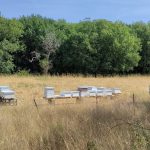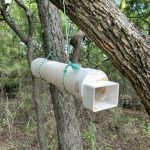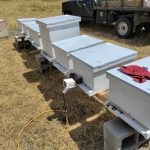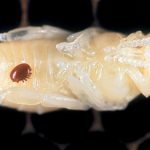This year has been so very dry (up until this week) – and natural food availability has been very scarce for the honeybees. You may have noticed that I’ve making rounds more often this summer to make  sure they have supplemental feeding with sugar syrup provided directly into the hives, as well as protein supplements – to stimulate brood rearing. I’ll also be placing/refilling powdered pollen substitute near(ish) to the hives for supplemental feeding. The goal with the feeding is to not only sustain the bees – but provide extra food to allow them to survive through whatever winter will throw at us this next year. I have also been performing mite treatments on the colonies.
sure they have supplemental feeding with sugar syrup provided directly into the hives, as well as protein supplements – to stimulate brood rearing. I’ll also be placing/refilling powdered pollen substitute near(ish) to the hives for supplemental feeding. The goal with the feeding is to not only sustain the bees – but provide extra food to allow them to survive through whatever winter will throw at us this next year. I have also been performing mite treatments on the colonies.
I’d like to also pass along a reminder that as temperatures get cooler – it the optimal time to sow and plant your pollinator wildflower seed mixes for your 1-D-1 land management program. That gives the seeds and plants through the winter to germinate and start growth, then blooms in the spring and summer to provide nectar and pollen (carbohydrate and protein sources). Best germination is when the seeds can directly touch the soil and be covered lightly. Sowing on top of grasses has a significantly lower germination rate.
A good (yet verbose) set of seed sowing guidelines is here:
https://www.wildseedfarms.com/pages/planting-instructions ( Under the tab of “How do I sow my Sunflower Seeds: )
Pollinator wildflower mixes are available from companies such as:
Turner Seed (Breckenridge TX) https://www.turnerseed.com
Native American Seed Co. https://www.seedsource.com
American Meadows https://www.americanmeadows.com
Bulk Seed Store https://www.bulkseedstore.com
and Google turns up many other suppliers as well.
[ Updated for 2025 ]
Texas Apiary Inspection Service ( TAIS) maintains a list of registered beekeepers for specific properties. TAIS charges $35 per year for this listing. I personally pay TAIS this annual fee, and list myself as beekeeper for all of my client’s properties. Some counties Appraisal District may require that the property owner register themselves (even though they’re not the beekeeper) – and may require that the property owner obtain their own “Registration Number” (which is like a number assigned for identification) For the majority of my customers – are covered under MY TAIS registration number.
At the end of the year – I will be sending out an annual synopsis of the harvests from all my managed bees. In most cases this year, the harvest was in the form of producing more livestock (honeybees) to replace hives that may have perished.
Rex Smith
Harmony Hollow Apiary
469-251-2BEE (2233)
HarmonyHollowBees@gmail.com



Leave a Reply
You must be logged in to post a comment.